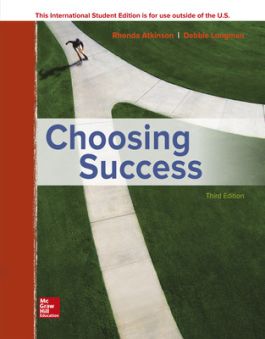Choosing Success ISE
After purchasing your eBook, login to the McGraw Hill Bookshelf website and redeem the access code from your order confirmation email.
- Access your eBook online or offline
- Easily highlight and take notes
- Fully searchable content
- Syncs across platforms
NOTE: eBook purchase does not include Connect homework or adaptive SmartBook assignments
Module 1.1: The First Week of Class
Module 1.2: How College Is Different
Module 1.3: 5C Approach for Decision Making
Module 1.4:Learning as an Active Decision
Module 1.5: Maximizing Your Use of Choosing Success
CHAPTER TWO: Interacting with Your College Community
Module 2.1: Understanding the Language of Your School: Catalog and Website Content
Module 2.2: Campus Offices, Resources, and Services
Module 2.3: Experiencing Campus Diversity
Module 2.4: Getting Involved: Joining Campus Groups
Module 2.5: Working with Faculty
Module 2.6: Communication and Conflict Resolution
CHAPTER THREE: Deciding to Know Yourself
Module 3.1: Aptitudes and Abilities
Module 3.2: Values
Module 3.3: Environmental Preferences
Module 3.4: Sensory Preferences
Module 3.5: Processing Preferences
Module 3.6: Your Multiple Intelligences
Module 3.7: Your Personality Type
Module 3.8: Your Instructor’s Style
CHAPTER FOUR: Choosing Goals for College and Life
Module 4.1: Identifying Goals
Module 4.2: Setting S.M.A.R.T.E.R. Goals
Module 4.3: Locus of Control
Module 4.4: Myths and Realities of Achieving Goals
Module 4.5: Mind Growth and Staying On Track
Module 4.6:Grade Point Average
CHAPTER FIVE: Decisions for Managing Time
Module 5.1: Overcoming Procrastination
Module 5.2: Managing Your Term and Week
Module 5.3: Daily To-Do Lists
Module 5.4: Choices about Self-Talk
Module 5.5: Achieving Balance
Module 5.6: Using Digital Time Management Tools
Module 5.7: Living Arrangements and Time Management
CHAPTER SIX: Choices for Succeeding in Class and Online Courses
Module 6.1: Choosing to Become an Active Listener in Class
Module 6.2: Listening in Different Learning Situations
Module 6.3: Taking Good Lecture Notes
Module 6.4: After-Class Follow-Through
Module 6.5: Digital Notetaking Tools
CHAPTER SEVEN: Choosing to Read Actively
Module 7.1: Preparing to Learn
Module 7.2: Reading Textbooks
Module 7.3: Course Readings in Nontraditional Text Formats
Module 7.4: Reading Math and Science Textbooks
Module 7.5: Online Reading Techniques
Module 7.6: Critical Reading and Thinking
CHAPTER EIGHT: Decisions about Study and Test Taking
Module 8.1: Decisions about Study Preparation
Module 8.2: Organizing Study Materials
Module 8.3: Choices for Practicing and Remembering Content
Module 8.4: Using Online Tools for Test Preparation
Module 8.5: Overcoming Test Anxiety
Module 8.6: Choices for Exam Success
Module 8.7: After-Exam Analysis
CHAPTER NINE: Making Choices about Today’s Technology
Module 9.1: Learning in the Digital Age
Module 9.2: Choices for Successful Use of the Internet and the Web
Module 9.3: Evaluating Worth
Module 9.4: Choices in Electronic Access
Module 9.5: Rights and Responsibilities of Digital Citizenship
Module 9.6: Deciding to Become a Distance Learner
CHAPTER TEN: Making Financial Decisions
Module 10.1: Budgeting
Module 10.2: Financing Your Education
Module 10.3: Managing Your Credit, Debit, and other Financial Decisions
Module 10.4: Protecting Your Digital Identity and Financial Reputation
CHAPTER ELEVEN: Choosing Health and Wellness
Module 11.1: What Is Stress?
Module 11.2: Coping with Stress and Crisis Situations
Module 11.3: Physical Fitness
Module 11.4: Making Decisions about Health Problems
Module 11.5: Safer Sex
Module 11.6: Staying Safe
CHAPTER TWELVE: Exploring Career Options and Opportunities
Module 12.1: Choosing a Major
Module 12.2: Degree Options
Module 12.3: Scheduling Coursework
Module 12.4: Planning for a Career
By incorporating a decision-making focus into every chapter, Choosing Success emphasizes accountability and conveys to students how important they are in their own success. Students do not merely become successful, but rather they choose to be successful.
Choice starts with the decision to acquire a secondary education, and from then on everything students do is based on their decision-making skills. The more they practice good decision making, the more control they have over their successes and failures. Choosing Success is unique in that it provides students with a process for decision making as well as numerous opportunities to think through the choices and decisions they face as a college student-and beyond.

